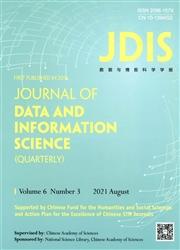基于文本生成方法从科学出版物中发现多学科问题
IF 1.5
3区 管理学
Q2 INFORMATION SCIENCE & LIBRARY SCIENCE
引用次数: 0
摘要
目的 提出一种基于文本生成的多学科问题识别方法,该方法不依赖大量数据注释。设计/方法/途径 该方法首先利用文本分类技术识别论文的研究目标类型和学科标签;其次,根据论文摘要和研究目标类型,利用生成式预训练语言模型为每篇论文生成抽象化标题;第三,根据正则表达式规则从生成的标题中提取问题短语;第四,利用加权社群检测算法创建问题关系网络并识别相同问题;最后,根据论文的学科标签识别多学科问题。研究结果 在 "碳峰值和碳中和 "领域的实验表明,所提出的方法能有效识别多学科研究问题。所发现问题的学科分布与我们对该领域多学科合作的理解是一致的。研究局限 有必要在其他多学科领域使用所提出的方法,以验证其有效性。实践意义 多学科问题识别有助于聚集多学科力量,为政府解决复杂的现实问题,为科研管理部门资助有价值的多学科问题,为科研人员借鉴其他学科的思路。独创性/价值 本方法提出了一种基于文本生成的新型多学科问题识别方法,该方法基于论文的生成性抽象标题识别多学科问题,无需标准序列标注技术所需的数据注释。本文章由计算机程序翻译,如有差异,请以英文原文为准。
Identifying multidisciplinary problems from scientific publications based on a text generation method
Purpose A text generation based multidisciplinary problem identification method is proposed, which does not rely on a large amount of data annotation. Design/methodology/approach The proposed method first identifies the research objective types and disciplinary labels of papers using a text classification technique; second, it generates abstractive titles for each paper based on abstract and research objective types using a generative pre-trained language model; third, it extracts problem phrases from generated titles according to regular expression rules; fourth, it creates problem relation networks and identifies the same problems by exploiting a weighted community detection algorithm; finally, it identifies multidisciplinary problems based on the disciplinary labels of papers. Findings Experiments in the “Carbon Peaking and Carbon Neutrality” field show that the proposed method can effectively identify multidisciplinary research problems. The disciplinary distribution of the identified problems is consistent with our understanding of multidisciplinary collaboration in the field. Research limitations It is necessary to use the proposed method in other multidisciplinary fields to validate its effectiveness. Practical implications Multidisciplinary problem identification helps to gather multidisciplinary forces to solve complex real-world problems for the governments, fund valuable multidisciplinary problems for research management authorities, and borrow ideas from other disciplines for researchers. Originality/value This approach proposes a novel multidisciplinary problem identification method based on text generation, which identifies multidisciplinary problems based on generative abstractive titles of papers without data annotation required by standard sequence labeling techniques.
求助全文
通过发布文献求助,成功后即可免费获取论文全文。
去求助
来源期刊

Journal of Data and Information Science
INFORMATION SCIENCE & LIBRARY SCIENCE-
CiteScore
3.50
自引率
6.70%
发文量
495
期刊介绍:
JDIS devotes itself to the study and application of the theories, methods, techniques, services, infrastructural facilities using big data to support knowledge discovery for decision & policy making. The basic emphasis is big data-based, analytics centered, knowledge discovery driven, and decision making supporting. The special effort is on the knowledge discovery to detect and predict structures, trends, behaviors, relations, evolutions and disruptions in research, innovation, business, politics, security, media and communications, and social development, where the big data may include metadata or full content data, text or non-textural data, structured or non-structural data, domain specific or cross-domain data, and dynamic or interactive data.
The main areas of interest are:
(1) New theories, methods, and techniques of big data based data mining, knowledge discovery, and informatics, including but not limited to scientometrics, communication analysis, social network analysis, tech & industry analysis, competitive intelligence, knowledge mapping, evidence based policy analysis, and predictive analysis.
(2) New methods, architectures, and facilities to develop or improve knowledge infrastructure capable to support knowledge organization and sophisticated analytics, including but not limited to ontology construction, knowledge organization, semantic linked data, knowledge integration and fusion, semantic retrieval, domain specific knowledge infrastructure, and semantic sciences.
(3) New mechanisms, methods, and tools to embed knowledge analytics and knowledge discovery into actual operation, service, or managerial processes, including but not limited to knowledge assisted scientific discovery, data mining driven intelligent workflows in learning, communications, and management.
Specific topic areas may include:
Knowledge organization
Knowledge discovery and data mining
Knowledge integration and fusion
Semantic Web metrics
Scientometrics
Analytic and diagnostic informetrics
Competitive intelligence
Predictive analysis
Social network analysis and metrics
Semantic and interactively analytic retrieval
Evidence-based policy analysis
Intelligent knowledge production
Knowledge-driven workflow management and decision-making
Knowledge-driven collaboration and its management
Domain knowledge infrastructure with knowledge fusion and analytics
Development of data and information services
 求助内容:
求助内容: 应助结果提醒方式:
应助结果提醒方式:


